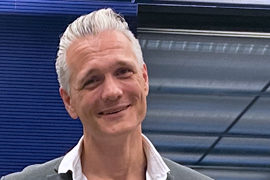Current Position
Head of Department / Senior Scientist, Molecular Genetics Thalassaemia Department
Associate Professor
Course Coordinator MM101: Molecular Basis of Monogenic Diseases
Course Coordinator Preparatory Course: Introduction to Molecular Biomedical Sciences
Coordinator Transferrable Skills lectures and CING Lectures site seminar series
Education
Dipl rer nat in Biology, University of Bonn, Germany, 1998
PhD in Molecular Biology, University of East Anglia, Norwich, UK, 2003
Research Interests
Key activities in the Molecular Genetics Thalassaemia Department include (i) translational research for the discovery of biomarkers and disease modifiers (e.g. Papasavva et al. 2021, Kountouris et al. 2021), (ii) population-wide diagnostics based on advanced PCR and short-read massive parallel sequencing (MPS/NGS) technologies (e.g. Byrou et al. 2018, Constantinou et al. 2022), and preimplantation genetic testing (PGT/PGD) for a range of genetic disorders, (iii) bioinformatic development of databases (e.g. ITHANET), patient registries (e.g. ENROL), variant curation (e.g. Kountouris et al. 2022) and epidemiology (e.g. Kountouris et al. 2021), (vi) education and training in research and diagnostic techniques and concepts of rare anaemias at postgraduate level, and (v) gene editing and advanced therapy development for rare anaemias and in particular β-thalassaemia (see e.g. Koniali et al. 2021, Lederer et al. 2022). As to the latter and in addition to the development of disease models, his research group in the department focuses on three different approaches:
- Mutation-specific RNAi-supplementation of gene addition. Based on lentiviral expression vectors for permanent gene addition in cell lines and in primary haematopoietic stem and progenitor cells. See e.g. Patsali et al. 2018
- Genome editing of disease modifiers. Based on designer nucleases and double-strand-break-independent editors for the removal or modification of γ-globin repressors and associated recognition elements, to activate the β-globin-like γ-globin gene. See e.g. Loucari et al. 2018, Patsali et al. 2019a, Papasavva et al. 2019, Papasavva et al. 2022, Papaioannou et al. 2023
- Homology-directed-repair–independent gene repair. Based on designer nucleases (CRISPR/Cas, TALEN) and base editors for the removal of aberrant regulatory elements and restoration of normal gene expression. See e.g. Patsali et al. 2019b, Patsali et al. 2019c
Biography
Dr Lederer received his PhD from the University of East Anglia for work in plant virology at the John Innes Centre, Norwich, UK. He now holds the position of Senior Scientist / Head of Department at the Molecular Genetics Thalassaemia Department (MGTD) of the Cyprus Institute of Neurology & Genetics (CING), where he leads the MGTD Gene Editing and Therapy unit and oversees further translational research, diagnostic, bioinformatic and education activities. Dr Lederer is Associate Professor and course coordinator at the CING Postgraduate Education, associate editor of Frontiers in Genome Editing and MDPI Genes, executive board member of the Global Globin Network, member of the core-development team of the ITHANET Portal, member of the ClinGen-recognised Haemoglobinopathies Variant Curation Expert Panel, president of the Cyprus Society of Human Genetics and board member of the Hellenic Society of Gene Therapy and Regenerative Medicine.
Publications
Dr Lederer is author of 52 peer-reviewed articles with over 2500 literature citations and an h index of 21 (i10 index 35). For an updated list of publications, see here.






0002.jpg)



